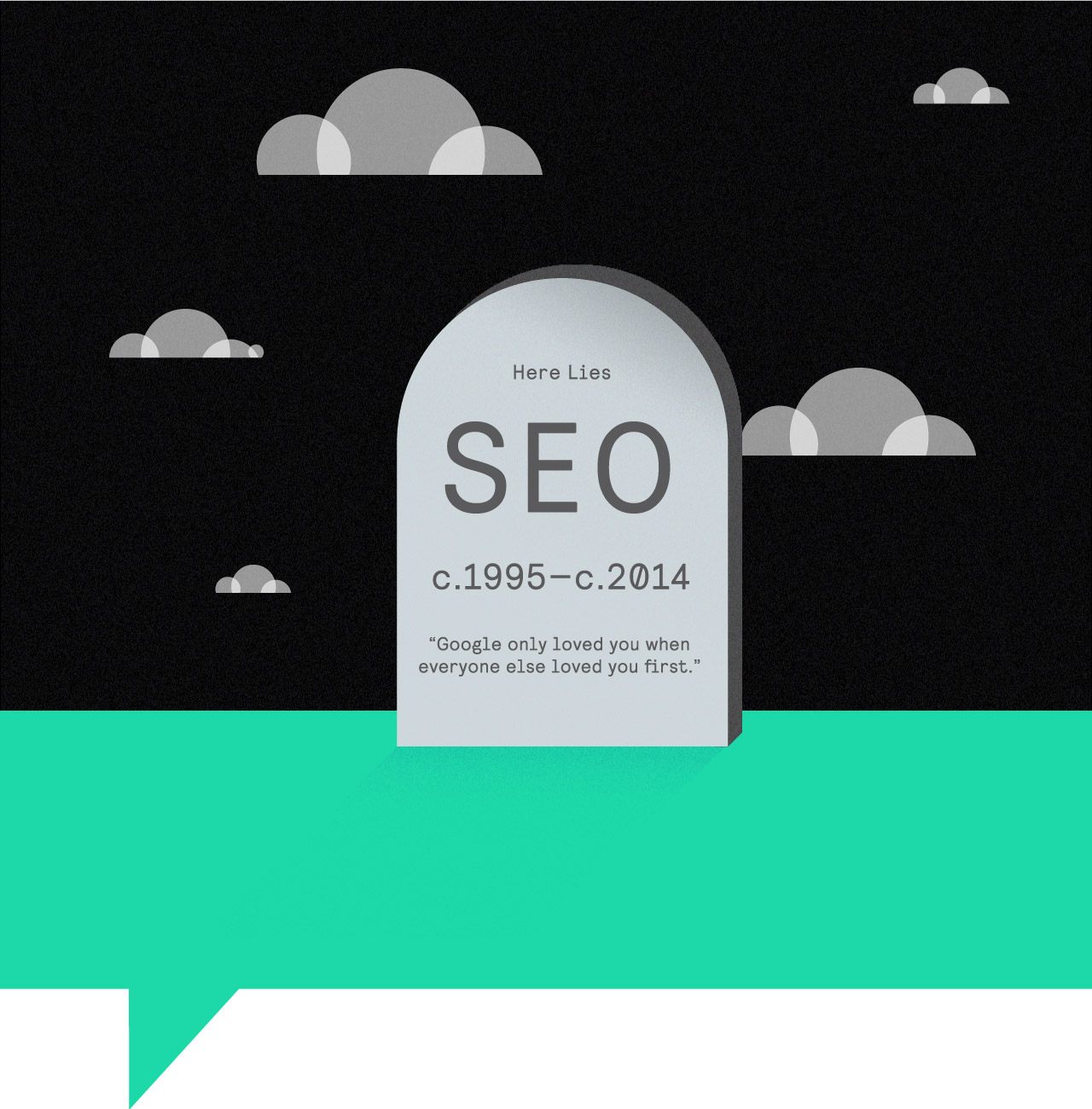David Foster Wallace: A Sort-of Paragon of Modern Virtues.
It’s fine to simplify. It’s vital to be able to communicate your point. But the problem is, if we’re all too concerned about everybody understanding everything, we inevitably stymie progress.
I’ve only recently discovered David Foster Wallace.
Actually, that deserves clarification; I’ve only recently discovered DFW in earnest. I’ve known of him for years in an abstract sense—Eggars’ Hero, Franzen’s Combatant, etc—but never taken the time to delve (and one really does need to delve) into the complex, difficult, beautiful, and ultimately painful story of what I can only really surmise as a brain that worked unsustainably hard.
Serious Literature has, admittedly, little to say in the modern world of branding. An environment of immediate gratification and (often, regrettably) lowest common denominator eyeballs is more aptly (or deftly) captured in aphorisms like ““Any fool can make something complicated. It takes a genius to make it simple” (Guthrie) or “If you can’t explain it to a six year old, you don’t understand it yourself” (Einstein) than it is in the more intricate and involved notions of minds like DFW’s. A tireless—and arguably peerless—perfectionist, Wallace also famously took over a decade to finish his second novel, and ultimately killed himself before he could finish his third; not the kind of deadlines today’s audience demands.
(As a quick aside, DFW did effectively foreshadow the advent of the hyperlinked article with his use of endnotes, and, though he took years to succumb to email over his preferred letter writing, was considered by many as the father of the modern style of writing for the Internet Age—for better or worse.)
However, what DFW will always stand for (in my opinion) and what he will always be relevant for (in my opinion) is the following:
A. Finding meaning.
This is exceptionally important in a hectic, over-crammed life. In his commencement address to graduates of Kenyon College in 2005 he describes the idea of finding meaning in the mundane. He talks about learning how to think as being a way of mastering control over what you construct meaning from: all too often we are shaped readily and easily by experiences. Learning to think, he argues, is about choosing what you pay attention to, deciding what defines you. It’s only through a more thoughtful analysis of experience that we can truly construct (constructive) meaning. As he says, “If you’re aware enough to give yourself a choice, you can choose to look differently. You get to decide what has meaning and what doesn’t.”

B. Digging deeper.
It’s fine to simplify. It’s vital to be able to communicate your point. But the problem is, if we’re all too concerned about everybody understanding everything, we inevitably stymie progress. As Benjamin Bratten suggests in this (ironically) illuminating TED Talk, if we’re all too concerned about getting the message across to the absolutely everyone, we wind up dumbing the message down in order to get the message across (or, more pointedly, get the message across before the viewer gets bored and closes the link.) If we talk to the level of the populace, we’re not doing anything to challenge or teach it. And that’s dangerous. Malcom Gladwell, for instance, is great at selling easy-to-read books. He’s not much use for anything else. DFW always took pains to explore the world, and his perspective on it. As a result his work requires focus and dedication (you try keeping up with a 1,185 word sentence without paying full attention); it demands that you take it seriously, and treat it with respect. But what it gives in return is almost certainly something that you hadn’t yet considered, and certainly hadn’t quite-as-properly articulated. If we dig too deep, and get lost in the details, sure, we can lose our audience. But if we don’t, and we insist on being glib and glossy, we have to ask ourselves what the hell we’re actually contributing.
C. Good grammar.
As digital media takes over completely (90% of all consumer interactions are now screen based), as “blog” becomes synonymous with “article” as social media becomes the most commonly used ad format for brands, the internet, and all of us on it, have two choices when it comes to grammar: step up or give up. I know which camp I’m in. DFW had a passion for language and logic, so unsurprisingly was a stickler for grammar (apparently he got it from his mum, an english teacher. She stayed the authority on it, as he used to excuse himself during teaching to call her and double check stickier questions), and wrote some amazing pieces on the subject and its import, both for his classes and for the wider public. Attached here, for your enjoyment (should you enjoy this sort of thing) are his Five Common Word Usage Mistakes, alternatively titled “ENGLISH 183A, 25 SEPTEMBER 2002—YOUR LIBERAL-ARTS $ AT WORK” for his Advanced Fiction writing class:
1. The preposition towards is British usage; the US spelling is toward. Writing towards is like writing colour or judgement. (Factoid: Except for backwards and afterwards, no preposition ending in -ward takes a final s in US usage.)
2. And is a conjunction; so is so. Except in dialogue between particular kinds of characters, you never need both conjunctions. “He needed to eat, and so he bought food” is incorrect. In 95% of cases like this, what you want to do is cut the and.
3. For a compound sentence to require a comma plus a conjunction, both its constituent clauses must be independent. An independent clause (a) has both a subject and a main verb, and (b) expresses a complete thought. In a sentence like “He ate all the food, and went back for more,” you don’t need both the comma and the and because the second clause isn’t independent.
4. There are certain words whose appearance at the beginning of a clause renders that clause dependent. (They basically keep the clause from expressing a complete thought.) Examples include since, while, because, although, and as. You may have learned to call these kinds of words Signal Words or Temporal Adverbs in high school. They, too, affect the punctuation of a compound sentence.
The crucial question is whether the clause that starts with a Signal Word occurs first in the sentence or not. If it does, you need a comma:
“As the wave crashed down, the surfer fell.” “While Bob ate all the food, Rhonda looked on in horror.”
If the relevant clause comes second, you do not need a comma:
“The surfer fell as the wave crashed down.” “Rhonda looked on in horror while Bob ate all the food.”
5. In real prose stylistics, though, the Signal Word thing can get a little tricky. If you look at the last sentence of item (3) above, you’ll notice that there is no comma between “and” and “because” in the compound “…you don’t need both the comma and the and because the second clause isn’t independent.” This is because of the basic rule outlined in (4). But because is a funny word, and sometimes you’ll need a comma before its appearance in the second clause in order to keep your sentence from giving the wrong impression. Example: Say Bob’s been murdered; the question is whether Rhonda did it. Look at the following two sentences:
a. “Rhonda didn’t do it because she loved him.”
b. “Rhonda didn’t do it, because she loved him.”
Sentence a, which is grammatically standard, here really says that Rhonda did kill Bob but that her reason for the murder wasn’t love, i.e., that the reason Rhonda killed Bob was not her love for him. Sentence b says that Rhonda did not kill Bob and that the reason she didn’t is that she loves him. In 99% of cases, what someone’ll be meaning to say is what b says. So, though nonstandard in the abstract, b can be semantically correct, correct in a meaning-based context.
BONUS:
If you’re into that, try this. It’s his succinct explanation of exactly what makes Roger Federer the greatest tennis player of all time. How fitting that it takes the best to describe the best.



